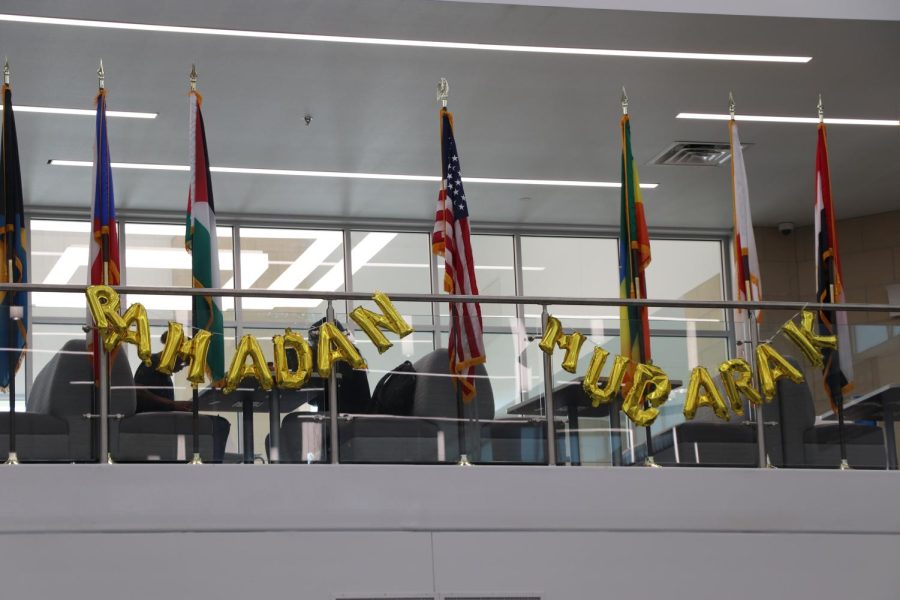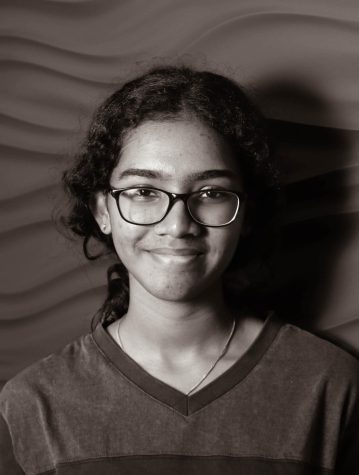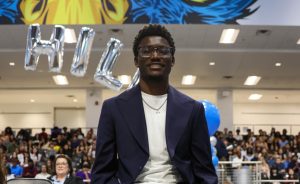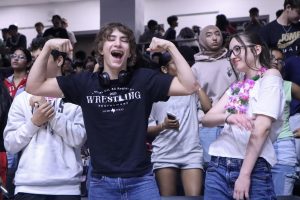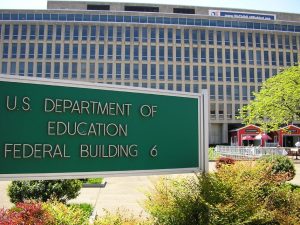Cultivating community and tolerance with the MSA
Balloons are inflated and hung in the school library to spell out “Ramadan Mubarak,” a traditional greeting among Muslims for the month of Ramadan. “We’re putting up decorations for Ramadan,” freshman Warisha Ali said. “Maybe some lanterns, maybe some lights. We might also hold some crafts events for decorations.” This is the Muslim Student Association’s first year in the school, with plans to keep the MSA active for many years ahead.
April 29, 2022
When Ramadan, a holy month where Muslims observe fasting, began in early April, freshman Warisha Ali saw how sitting in a cafeteria every day surrounded by food and noise might be uncomfortable for fasting students. This circumstance compelled her to put out an idea to the Muslim Student Association: to open the school’s courtroom so students may spend the 30 minutes allotted for lunch periods while simultaneously fostering community.
“I know a few people use the courtroom, but I am used to my younger sibling [pointedly] eating in front of me when I’m fasting,” junior and MSA member Ayeesga Shaikh said, “but it depends on each person’s comfort level and the day–if you really cannot stand people eating its a place to go. But it’s a nice gesture nevertheless, and I appreciate it.”
At the beginning of the academic year, similar considerations of community bonding and judgment-free places prompted Ali and other friends to find the MSA, seeing an opportunity for inclusivity in a newly established school. Executive board members organize the association’s events and meetings. Still, all members have plenty of chances to volunteer, with decorations, food for events, and other aspects of running a club.
“I wanted to be more involved [in the MSA],” sophomore and class officer Amin Aannab said. “Coming from a school [Lafayette Street School, NJ] where we didn’t really have the association or anything similar to it, [the MSA] is just really nice to volunteer with and be a part of. I’m able to see why someone would appreciate having a community and people you can relate to when it comes to religion.”
Founding the MSA was tedious and involved the usual struggles of establishing a club. First, the founders had to find a sponsor who wasn’t already involved with many clubs and who was open-minded regarding religion-oriented clubs. Increasing membership wasn’t very difficult, though, as the club’s inclusive nature and simple publicity such as flyers added around 50 new members in a few months.
“We knew there were other religious clubs in the school and thought we might as well have our own to provide representation,” Ali said. “[Law teacher Joshua Rogers] was open to sponsoring us and knowledgeable about processes, permissions and [preliminary] steps while holding religious events in the school. But essentially, it is just a club and open to all students, not just Muslim students.”
The MSA often collaborates with other clubs to broaden their community, most recently gathering for crafts with the Asian Student Union. Along with Prosper High School’s MSA, they will facilitate an Eid Celebration, a holiday marking the end of Ramadan, at PHS on Sunday, May 8. Within the association, they regularly congregate for prayers and weekly meetings.
“Whatever they want [an event or activity] to be, I’m there to facilitate it,” Joshua Rogers said. “It’s their vision, their goals, their plans, and I’m just that one person who can email the right people to go through with it and get it on schedule.”
Along with providing a space for the community, the MSA wanted to address the inconvenience Muslims might go through if they wanted to pray during school hours. Among five daily prayer times, one falls during school hours and consequently is easy to miss. Responding to this, the MSA arranged to use an idle room, keeping it open as a quiet space for students to pray.
“If we’re going to miss a prayer every single day because of school, that’s going to affect us,” Ali said. “Religiously, it’s important. By the time we got home, we wouldn’t have time to pray. So we thought that we should have this space because it’s going to be an issue every day. This way, students could go in at lunch and pray.”
The room also makes praying together an option. The MSA focuses on ensuring that religious obligations don’t feel isolating. With gatherings like their Iftar on April 13, they were able to bring shared and diverse cultures to break fast together.
“Usually, [Iftar] is something that you do alone or with your family,” Aannab said, “but we thought [having it at school] would be a really good chance to bond and socialize with each other too. It feels more important and special when we break fast together, even though we otherwise do it every day. Having a community really does make a difference.”
Realizing the role such clubs play in making the school an accommodating and diverse place, they look forward to keeping the MSA alive for years to come.
“I’ve seen firsthand the importance of belonging, how it encourages mental health,” Rogers said. “I don’t know exactly how many clubs are here, but the list is pretty long. When you have 2700 kids in a school, it’s easy to feel lost. Every student walking across the hallways has a [similar community]; they just don’t know it.”


